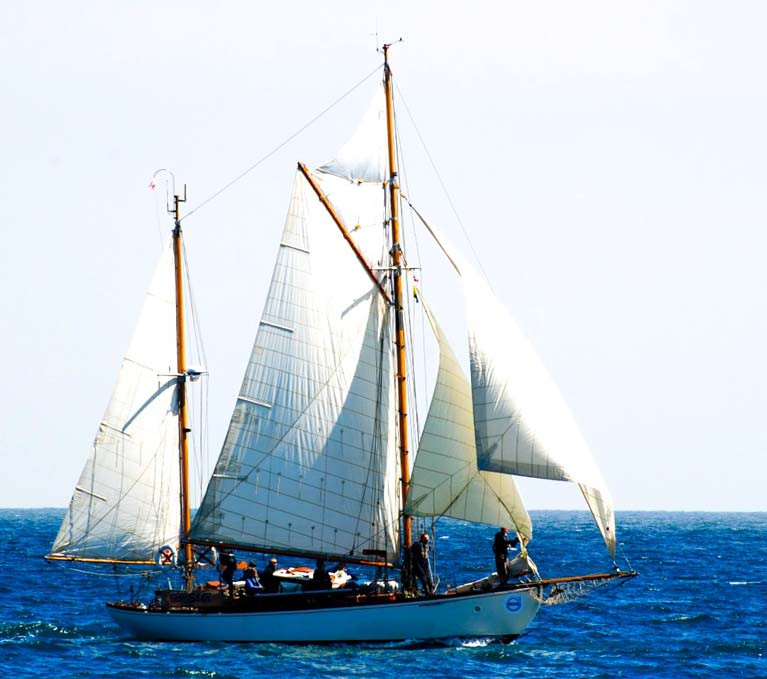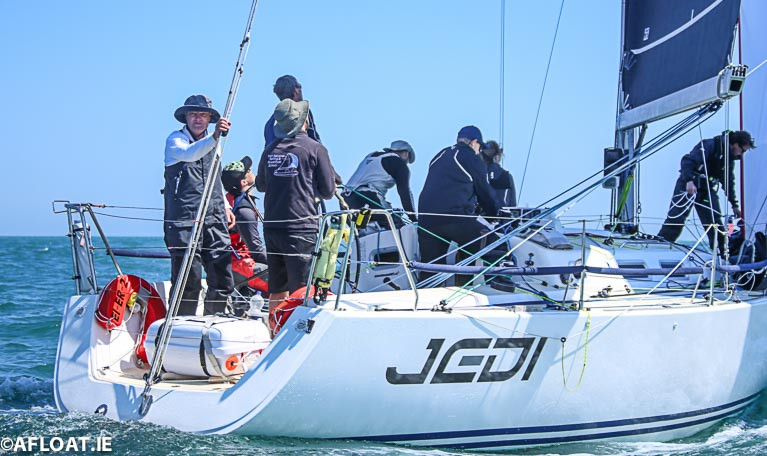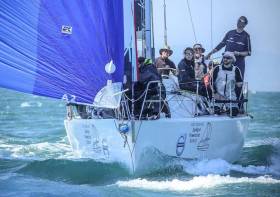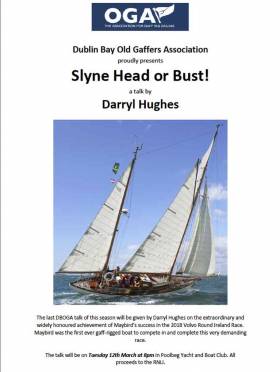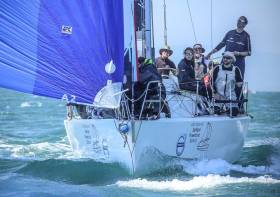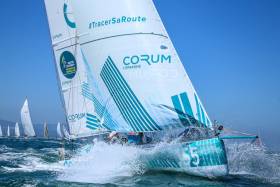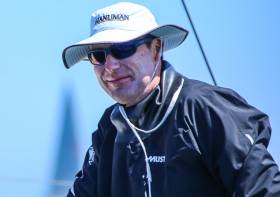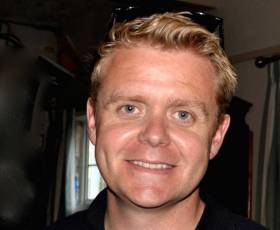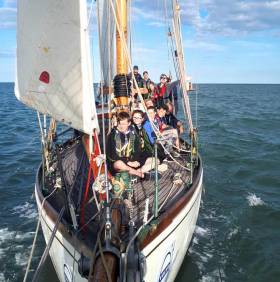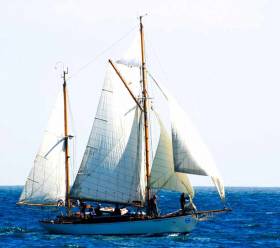Displaying items by tag: Round Ireland Yacht Race
Historic New Trophy for SSE Renewables Round Ireland Race
The SSE Renewables Round Ireland Yacht Race from Wicklow on June 20th 2020 will attract some of the hottest new offshore racers to be seen in Irish and European waters. But there will be some more senior and even classic craft in the fleet, and in the 2018 race, Darryl Hughes’ immaculately-restored 1937 43ft Tyrrell gaff ketch Maybird became both the oldest and the first gaff-rigged boat to complete the race.
It was quite a moment when Maybird crossed the finish line in the sunshine, and rumours abound as to how long her post-race party went on both in Wicklow and her birthplace of Arklow, which had provided some of her crew. We do know it was deservedly quite a celebration, and the whole experience has left Darryl with such fond memories that he got to wondering if some trophy honouring Maybird might be accepted for future Round Irelands to celebrate the oldest boat to complete the course each time the biennial race is sailed.
Wicklow Sailing Club – where master thatcher Kyran O’Grady is now Commodore, and which led the way in welcoming Maybird home – are very taken with the idea. So in the workshop at his recently-acquired house in Crosshaven, Darryl has been crafting the Maybird Mast Trophy from timber salvaged from some of the ketch’s original spars. The resulting trophy will have added meaning in several ways, not least in that it will be a piece of high-quality woodwork which - in its original form - will have been handled by the great Jack Tyrrell himself, a world-renowned shipwright who gave real meaning to the term “hands-on management”.
Royal Irish Yacht Club skipper Michael Boyd leads the race for a Volvo Car prize in this year's edition of the SSE Renewables Round Ireland Race but only three points separate the top four skippers overall.
The prize will be decided after this year's edition of the offshore classic that starts from Wicklow Sailing Club on June 20th.
The skipper who has accumulated the best overall points' results on corrected time, over the three Round Irelands 2016, 2018 and 2020 will be presented with a brand new Volvo V40 or equivalent at the Prizegiving for the 2020 Race.
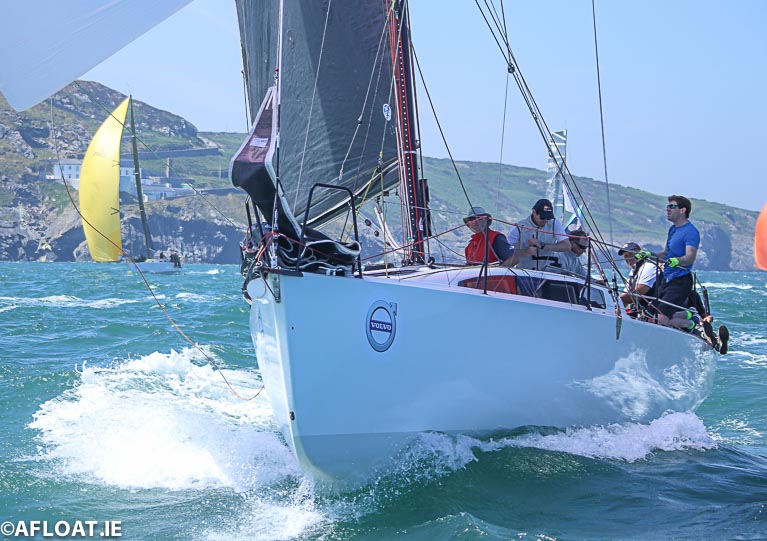 Rockabill VI - Paul O'Higgins
Rockabill VI - Paul O'Higgins
The current leaderboard shows Dublin Bay sailor Michael Boyd, a Round Ireland stalwart, who sailed the J109 Jedi in the 2018 race and the Beneteau 44.7 Lisa in 2016 on 16 points overall. Royal Cork skipper Ian Hickey on Cavatina is next on 19 points and shares the same points with Rob Craigie from the Sunfast3600 Bellino and 2019 ISORA Champion Paul O'Higgins, the skipper of the JPK10.80 Rockabill VI also on 19 points.
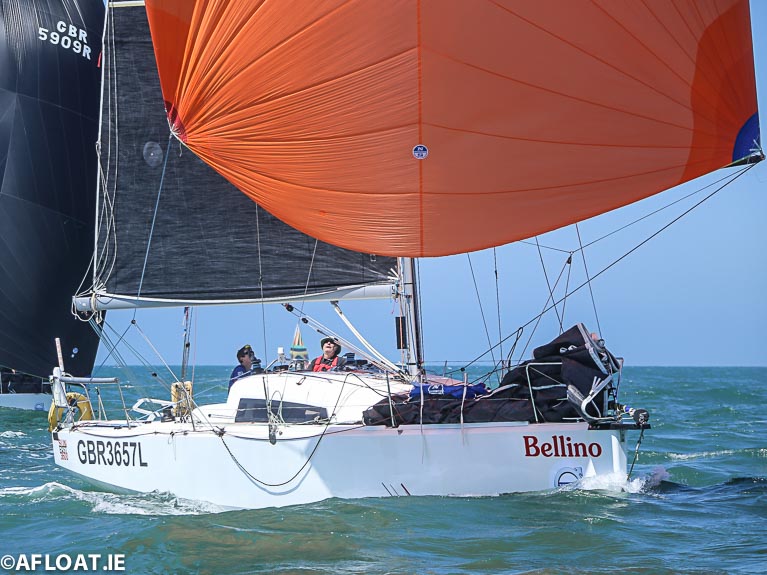 Bellino - Rob Craigie
Bellino - Rob Craigie
With typically nearly 50 yachts signed up for each biennial, a significant number of skippers are in the running for the prize. As Afloat reported in May 2016, the idea behind it is to further develop the race by encouraging sailors to return to complete the epic 700-mile contest over three races.
Downloadable below is the current RI spreadsheet of those skippers in with a chance of winning the Volvo car, a V40 or equivalent.
Kenneth Rumball and John White are taking the Irish National Sailing and Powerboat School’s popular ‘man overboard’ lecture to the Royal Ocean Racing Club’s London clubhouse this evening (Thursday 16 May).
On 29 June 2018, the J109 yacht Jedi started the Round Ireland Yacht Race — but little did her crew of eight know that just says later, at 1am on 2 July, crew member John White would be swept overboard south-west of the Blasket Islands.
After well received talks at Wicklow Sailing Club in January and the Royal Irish Yacht Club in February, Rumball and White are in London to tell the story of how Jedi’s crew dealt with the situation — and what lessons were learnt from the incident.
Tonight’s RORC talk from 7pm is free for members and £10 for non-members, with booking available online HERE. For dinner reservations following the presentation email [email protected] or call +44 (0)207 493 2248.
One of the most unusual achievements of 2018’s Irish sailing season was the veteran gaff-rigged ketch Maybird’s completion of the Volvo Round Ireland Race writes W M Nixon. Built by Tyrrell of Arklow in 1937, the 43ft Maybird was superbly restored by owner Darryl Hughes between 2009 and 2011, and since then she has made many successful voyages. But the 704-mile Round Ireland Race 2018 – with its notorious reputation for hundreds of miles of rugged windward work – presented an extra non-stop challenge.
"So why is it called “Slyne Head or Bust”? That we can reveal".
Yet they did it. They may have taken quite a bit of time to do it, but they did it. And you can learn all about it – and much more – at Poolbeg Y & BC in Ringsend in the heart of Dublin on Tuesday, March 12th at 8.0pm, courtesy of the Dublin Bay Old Gaffers Association, admission €5 and all takings going to the Lifeboats.
So why is it called “Slyne Head or Bust”? That we can reveal. Racing Round Ireland from Wicklow, once Slyne Head is astern, you’re on the home stretch. No matter how worn down you are, the handiest way back to Wicklow is to just keep on racing. Simple, really.
On the 29th of June 2018, Jedi, the highly competitive J109, started the Round Ireland Yacht Race in stunning sunshine and a fresh northerly breeze propelling her down the East coast of Ireland.
Little did her seasoned crew comprising of Michael Boyd (Skipper), Kenneth Rumball, James Gunn, John White, Philip Connor, Lorcan Tighe, Kylie McMillan and Diarmud McLaughlin would have in store for them some days later.
At 1 am on the 2nd of July 2018 just South West of the Blasket Islands, well reefed down in 30-35kts of a Northerly breeze, crew member John White was swept overboard.
"Crew member John White was swept overboard"
You can hear the story of how Jedi’s crew dealt with the situation and successfully recovered John back on board within minutes and most importantly the lessons learnt from the incident.
Kenneth, John and members of the crew will be giving two talks and all are welcome, with each club offering donations to different charities.
- Wicklow Sailing Club 1930hrs on the 12th January 2018 donations to Wicklow Hospice, food and refreshments available from 1830hrs.
- Royal Irish Yacht Club 1930hrs on 7th of February with Sailing Supper Afterwards, bookings with [email protected]
Round Ireland Yacht Race 2020 Date is June 20
Wicklow Sailing Club has written to competitors and supporters alike to fix the date of the 2020 Round Ireland race as Saturday, June 20 2020.
Ireland's classic 700-mile offshore race has been buoyed up by some bumper fleets over the last two editions and organisers are expecting to build-on this for the 2020 race.
The biennial race is organised jointly with the Royal Irish Yacht Club in Dun Laoghaire and the Royal Ocean Racing Club in London. The Round Ireland race forms part of RORC's overall Points Championships.
The defending champion is Niall Dowling of the Royal Irish YC who took both Line Honours and the Overall Win in with the Ker 43 Baraka GP in July.
Niall Dowling is July 'Sailor of the Month' (Offshore)
The achievement of Niall Dowling of the Royal Irish YC in taking both Line Honours and the Overall Win in Wicklow’s Volvo Round Ireland Race 2018 with the Ker 43 Baraka GP is put into its proper perspective when we remember that at the halfway stage, Baraka was way down the rankings despite a tactically brilliant performance.
Until then, conditions had been completely stacked against her, such that off the coast of Mayo, she was in lowly 24th overall. But then things started to turn in her favour, with brilliant tactics and sailing to take the fullest possible advantage of the slightest helpful slant. Having had a mountain to climb, they climbed it at speed and then skied down the other side to a runaway victory.
Barry Byrne is July’s 'Sailor of the Month'
July 2018 will go down in Irish sailing history as one of the busiest months ever experienced, including as it did the Volvo Round Ireland Race and Volvo Cork Week.
In this exceptionally busy period, Commandant Barry Byrne of the Defence Forces was arguably the most active sailor on our seas, as he skippered the Irish Defence Forces on the J/109 Joker 2 to second overall and victory in the Corinthian Division of the Round Ireland Race, and in Cork Week he not only played a key role in organizing the highlight event, the Beaufort Cup series for services crews, but he successfully defended it, again skippering Joker 2.
Arklow Sea Scouts & Sailing Club Celebrate Veteran Maybird’s Round Ireland Race Achievement
The many strands of Arklow’s maritime life, and its seafaring and boat-building traditions, have been getting together this week to celebrate the achievement of Darryl Hughes’ veteran ketch Maybird writes W M Nixon. Last week, the 1937-vintage Arklow-built Maybird became the oldest boat ever to complete the Volvo Round Ireland Race, and also the first setting the traditional gaff rig.
These days, the thriving Arklow Sailing Club includes some of the most modern sailing boats in Ireland, while its maritime traditions are most strongly expressed through the Tyrrell family’s busy Arklow Shipping company, which operates a fleet of 50 specialist vessels.
As well, the historic port is a centre of strength for the Sea Scout movement, in many cases providing the first steps afloat for the seafarers and ship managers of the future. But while there is this healthy regard for the present and the future, Arklow’s notable past associations with the sea and sailing are also respected, and the popular achievement of Maybird has provided an ideal focal point for a celebration of that heritage.
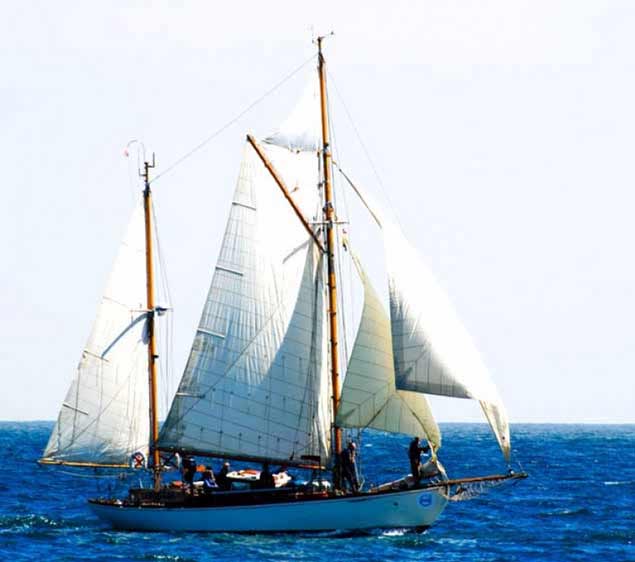 History is made. The 1937-built Arklow ketch Maybird finishes the 2018 Round Ireland race at Wicklow. Photo Maeve Quinn
History is made. The 1937-built Arklow ketch Maybird finishes the 2018 Round Ireland race at Wicklow. Photo Maeve Quinn
This week, the immaculately-restored veteran 81-year-old ketch has been back at her birthplace, and on Monday, Tuesday and Wednesday she took groups of local Sea Scouts out on sailing exercises, co-ordinated by leader Jimmy Mylor with former Sea Scouts Dylan Clancy, Cillian Kavanagh and Aaron O’Neill much involved.
Then on Wednesday evening after Arklow SC’s mid-week race, a celebratory reception was hosted in the clubhouse by Arklow SC’s Commodore Mark Fallon, with ASC Committee member Paul “Murph” Murphy organising a distinguished and convivial gathering at which the Guest of Honour was Miriam Murphy, Cathaoirleach of Arklow Municipal District Council, while Jimmy Tyrrel, son of Maybird’s builder Jack Tyrrell, was also present.
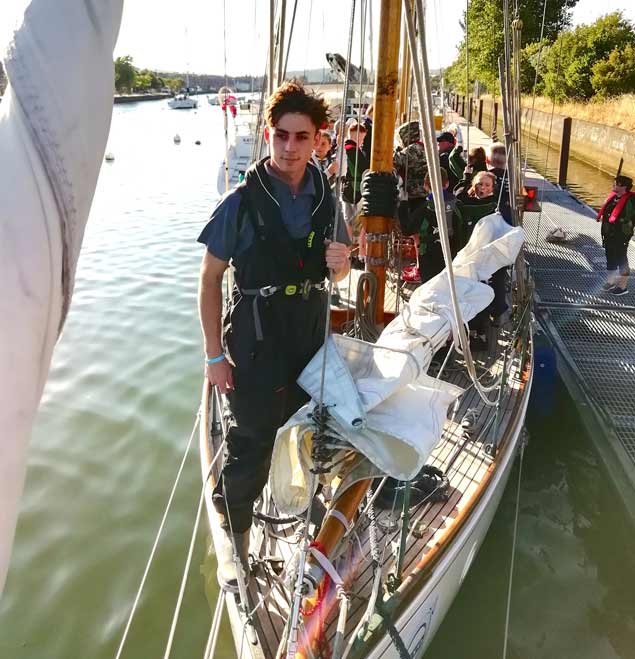 Maybird takes on crew in the river at Arklow – in foreground is former Sea Scout Cillian Kavanagh, one of the group co-ordinators
Maybird takes on crew in the river at Arklow – in foreground is former Sea Scout Cillian Kavanagh, one of the group co-ordinators
Maybird raced round Ireland with an eclectic crew of eight, and two of them – Pete Brennan and Eoin Quinn – have returned home to Florida and Switzerland respectively. But the remaining six – Darryl Hughes, Noeleen Hurley, Irene Reidy, Liam Quinn, Paul Carroll and Michael Clear, four of whom are ASC members – were very much there for this first reunion of a special group, and they’d the satisfaction of seeing their skipper and his fine little ship being presented by a commemorative turned wooden bowl crafted from the Arklow-built Asgard II’s first foremast, and inscribed with the Maybird name.
The word is that the party in ASC went on until about 0300 hrs, and after this memorable expedition to the Irish Sea and circuit of Ireland, Maybird will now return to her main base of Crosshaven on Cork Harbour.
Golden Oldie Maybird’s Round Ireland Race Achievement to be Celebrated at her Arklow Birthplace
When the 1937-vintage Tyrrell of Arklow-built 43ft gaff ketch Maybird (Darryl Hughes) finally crossed the line at Wicklow last week to record the longest-ever time for a Volvo Round Ireland Race, little did her crew of eight expect that their unique achievement would bring them popular fame writes W M Nixon.
But the fact that they kept gamely battling on against a wide variety of difficult sailing conditions, which had made the 704 miles course very challenging for even the most modern racing machines, gave the Maybird finish a special appeal. During the race, as the newer faster boats slipped away, Maybird was soon sailing a challenge of her own. Where the leaders had fair winds, she eventually found calm or headwinds. Where they’d had strong winds, by the time Maybird got there, conditions had become light – particularly off the West Coast, putting frustration amidst all the extra difficulties of sailing the Atlantic.
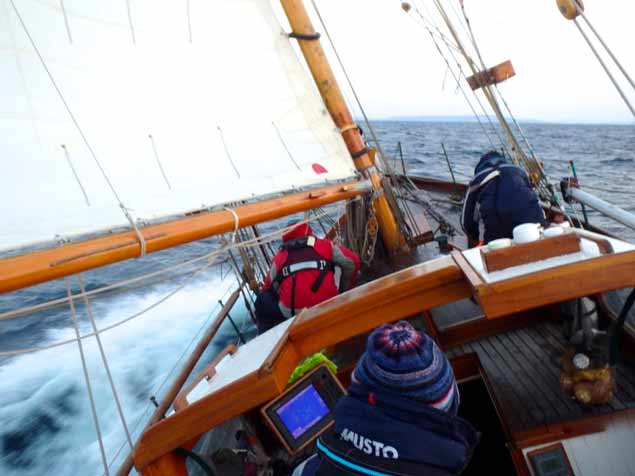 This is the sort of wind they hoped for……..Photo: Michael Clear
This is the sort of wind they hoped for……..Photo: Michael Clear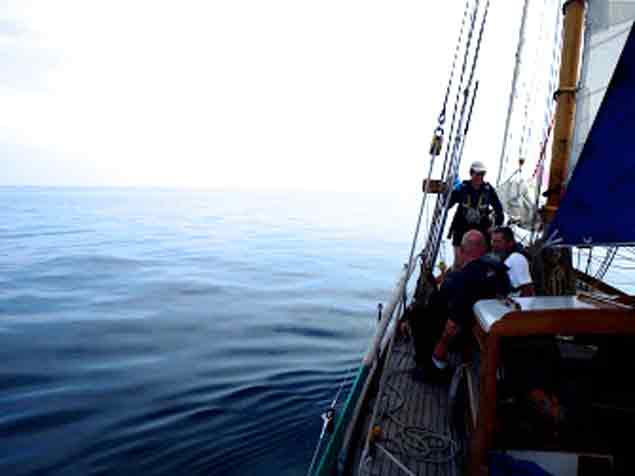 ……yet all too often, this is what they got. Photo: Michael Clear
……yet all too often, this is what they got. Photo: Michael Clear
But Maybird’s crew of Noeleen Hurley, Darryl Hughes, Michael Clear and Eoin Quinn in what became known as the Tyrrell Watch, and Irene Reidy, Liam Quinn, Paul Carroll and Pete Brennan in the Asgard Watch – they just kept going, and took it as it came, fair wind or foul, calm or strong.
The distinctive blue mizzen staysail – the lightest sail, in the ship – was up and down so many times that owner Darryl Hughes, who personally Project Managed the Maybird Restoration in 1909-1911, reckons that if he got €1 for every time it was set or stowed, he could buy a whole new set of sails. They also had plenty of work to use the floater set forward of the mainmast. But the real progress was made when Maybird was lucky enough to experience a good reaching breeze. She burned off the miles in style.
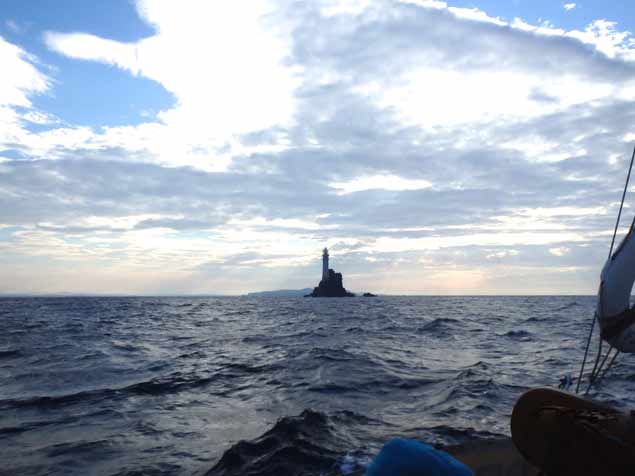 A race highlight for all competitors – putting the Fastnet Rock astern. Photo: Michael Clear
A race highlight for all competitors – putting the Fastnet Rock astern. Photo: Michael Clear
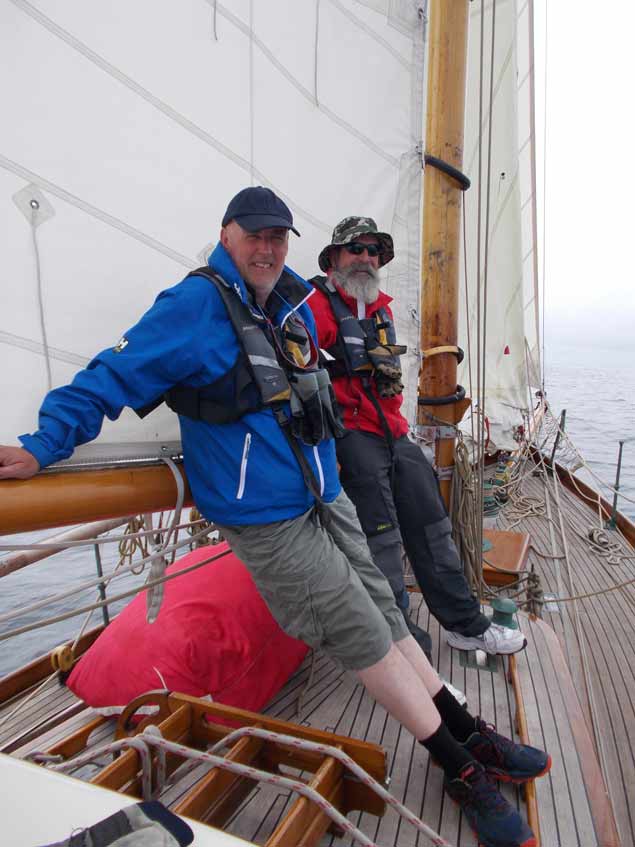 There were times when the only duty was stopping the boom banging about in calm – Paul Carroll and Pete Brennan at their work. Photo: Michael Clea
There were times when the only duty was stopping the boom banging about in calm – Paul Carroll and Pete Brennan at their work. Photo: Michael Clea
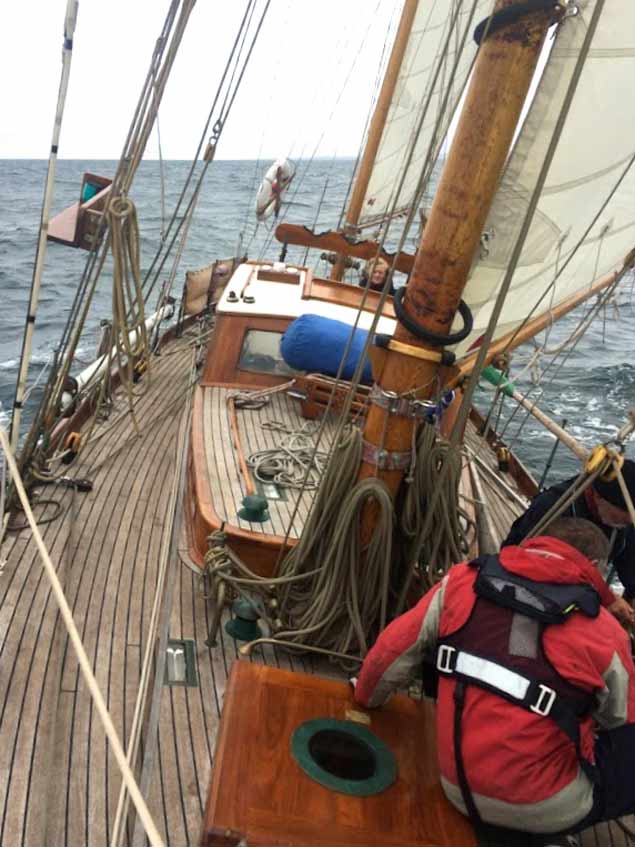 At last a breath of wind arrives, and in time becomes a good breeze
At last a breath of wind arrives, and in time becomes a good breeze
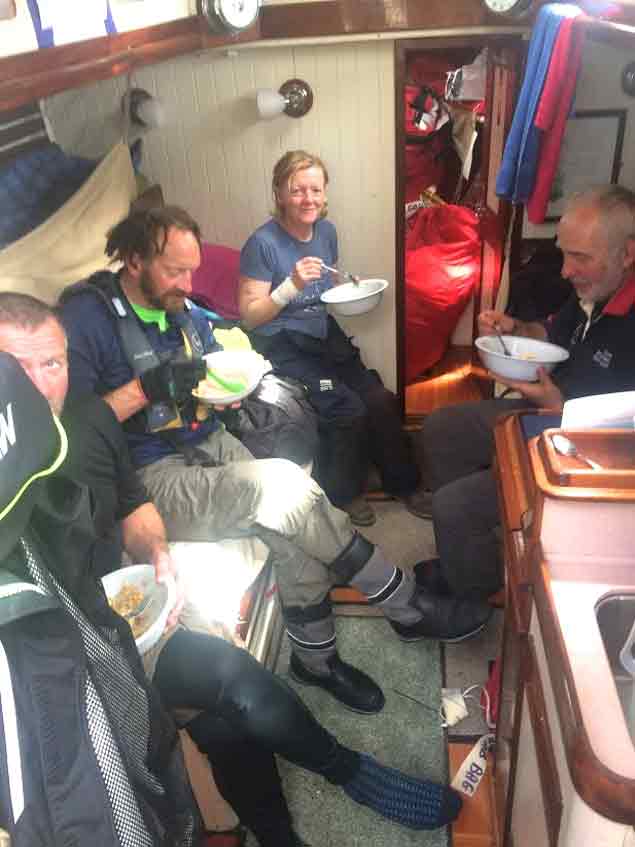 “Dinner is served”. Life could become quite basic. Photo: Michael Clear
“Dinner is served”. Life could become quite basic. Photo: Michael Clear
Shipboard routine set in. As anyone who has ever been aboard Maybird will attest, normally she is the very essence of style and tidiness below. But with eight people to be fed and slept, sometimes life became quite basic, but they fed well and as they settled down, slept well too when off watch.
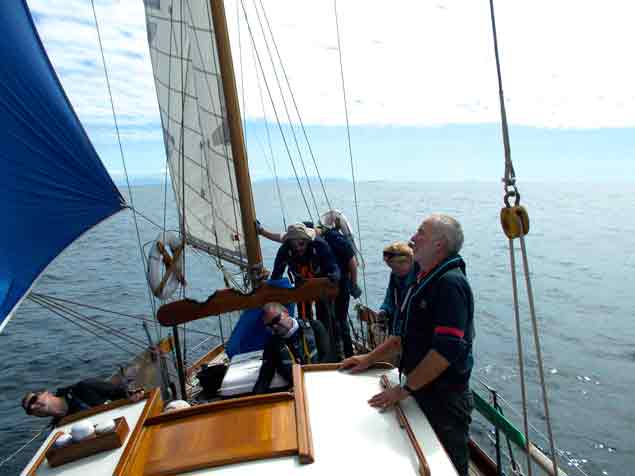 Setting the mizzen staysail – in the lightest airs, it was the only sail that worked
Setting the mizzen staysail – in the lightest airs, it was the only sail that worked
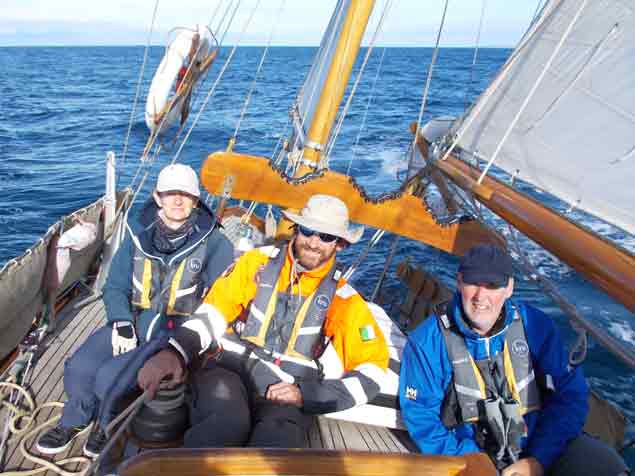 Finally getting there – Irene Reidy, Liam Quinn and Paul Carroll of the “Asgard Watch”. Photo: Pete Brennan
Finally getting there – Irene Reidy, Liam Quinn and Paul Carroll of the “Asgard Watch”. Photo: Pete Brennan
And as they gradually ticked off the major headlands and getting back to Wicklow became a realisable dream, spirits continued to rise and they found a splendid and sunny fair wind from the northeast to sweep them towards the finish, coming into the most hospitable port of Wicklow town to find that the entire Round Ireland Race Committee, many WSC member, and an additional host of family and well-wishers, were all there to greet them.
As the reality of what had been achieved began to be fully realised, the celebrations and acknowledgement came thick and fast. Maybird is the oldest boat and the only gaff-rigged vessel ever to complete the Round Ireland course. And as she also completed the Fastnet Race in 2011, she has now registered a remarkable double.
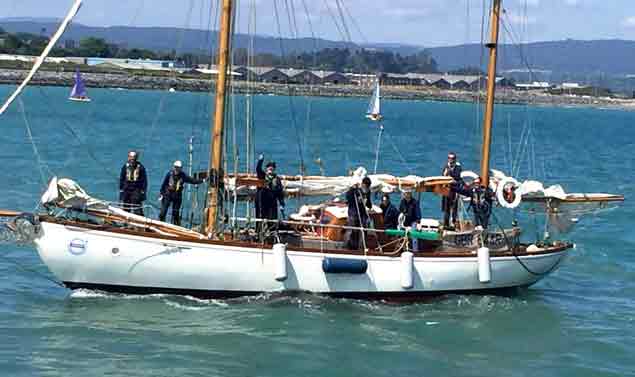 Job done. Maybird coming into Wicklow Harbour. Photo: Maeve Quinn
Job done. Maybird coming into Wicklow Harbour. Photo: Maeve Quinn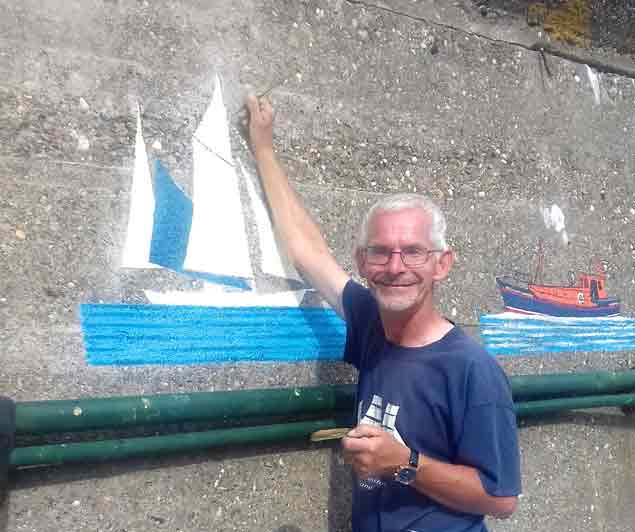 Immortalised. Pat the Postie adds Maybird’s portrait to the Special Vessels gallery on Wicklow pier
Immortalised. Pat the Postie adds Maybird’s portrait to the Special Vessels gallery on Wicklow pier
Very soon word came that Pat the Postie, Wicklow’s waterfront artist who provides a painting of every visiting boat of special significance on the pier wall, was adding Maybird to the collection. And meanwhile, Arklow Sailing Club, based in Maybird’s birthplace and the provider of half of her Round Ireland crew, has been putting together a programme of celebration which gets underway this weekend.
Maybird’s achievement could not have been more timely, as the Tyrrell of Arklow Archives – collected by the late Michael Tyrrell – are currently being scanned in UCD for Criostoir Mac Carthaigh, Director of the Irish Folklore Commission, with the encouragement of maritime historian Hal Sisk.
"There’ll be the mother of all celebratory parties in Arklow Sailing Club"
This new focus on Arklow’s maritime traditions will be highlighted by Maybird’s time in the south Wicklow port next week. She’ll be in Arklow from Monday, July 23rd to Thursday, July 26th, and in addition to providing time for visitors, she’ll be taking Sea Scouts and other junior groups out sailing. But the highlight of the week will be on the evening of Wednesday, July 25th, when she’ll sail with the Arklow SC fleet in their weekly evening race, and afterwards, there’ll be the mother of all celebratory parties in the ASC clubhouse from 7.30pm onwards, when all will be welcome.
For those members of Maybird’s crew who were thinking that everything - the race completed and the celebrations planned - all seemed just too good to be true, this week’s Wicklow People – published on Wednesday – gives a big spread to the story, giving it added reality. And the true story is that Maybird and all the great seafaring and boat-building traditions of Arklow are indeed coming home.
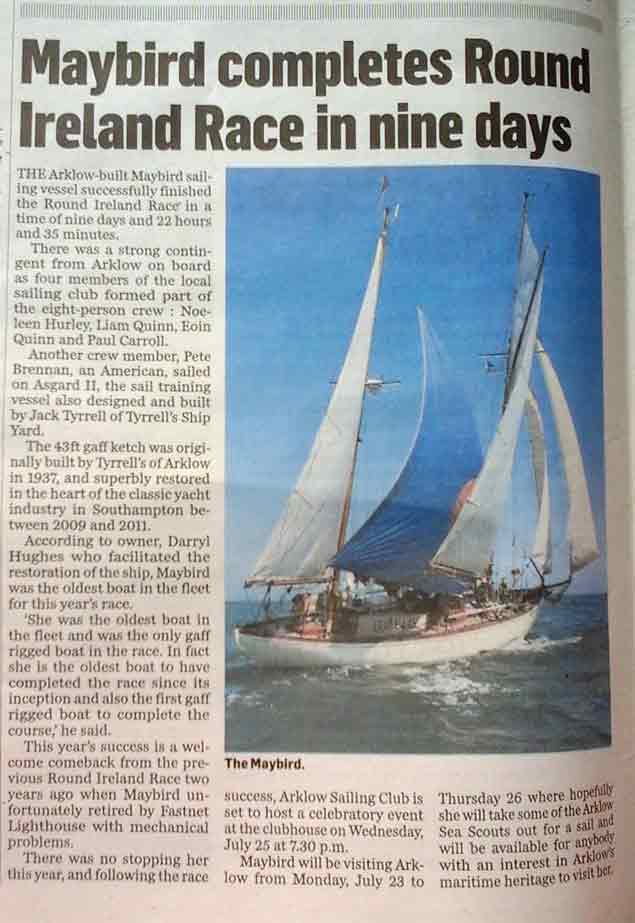 Read all about it! The up-coming celebrations in Arklow are given a big spread in this week’s Wicklow People
Read all about it! The up-coming celebrations in Arklow are given a big spread in this week’s Wicklow People



























